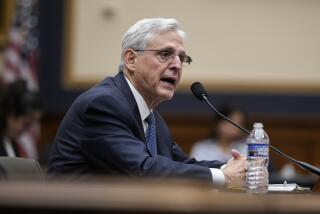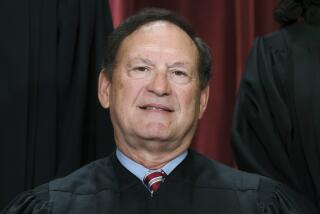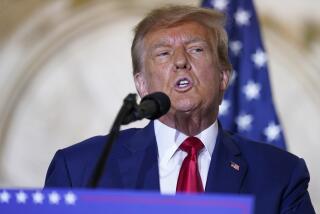Starr Urges Scrapping Independent Counsel Act
WASHINGTON — The man who touched off a national controversy over the Independent Counsel Act illustrated Wednesday why reforming the institution has become such a maze of contradictions and blind alleys.
Independent counsel Kenneth W. Starr, testifying before a Senate committee considering whether to revise the law or scrap it altogether, blasted the statute for leading to investigations that are too open-ended, too costly and subject to harsh political attack.
“No matter what the Congress decides, no matter what microsurgical precision is applied to fine-tune the statute, these problems will endure,” Starr testified.
Yet Starr made clear that he intends to continue his broad-ranging, five-year Whitewater investigation; pursue possible criminal prosecution of President Clinton after he leaves the White House; and take whatever political heat it generates.
Critical Democrats blamed Starr, more than the law, for what they said was his mistreatment of convicted Whitewater conspirator Susan McDougal as well as former White House intern Monica S. Lewinsky, whose affair with Clinton led to the president’s impeachment.
Democrat Asks Why He Doesn’t Resign
Sen. Richard Durbin (D-Ill.) asked Starr why he should not leave office immediately under “this constitutional monstrosity of a statute”--and even Republicans expressed dismay.
“If the law is as bad as you say it is, maybe we should just abrogate it now,” said Sen. Arlen Specter (R-Pa.).
The exchanges in some ways captured a legislative debate that has found no shortage of flaws in the current system but few alternatives that would eliminate them or avoid creating additional ones.
With a welter of proposals on the table, Sen. Fred Thompson (R-Tenn.), chairman of the Governmental Affairs Committee, reflected on the remoteness of any solution, saying, “There is no need for the committee to rush to judgment.”
Starr replied that although he believes the law that expires June 30 is “structurally unsound,” his office is “going to enforce the law.”
“That’s our duty. That’s our obligation,” he said.
Starr’s testimony that the act should be scrapped ran into conflicting sentiment from some of his staunchest GOP supporters, who noted that abandonment of the law would leave sensitive political investigations in the hands of Atty. Gen. Janet Reno.
Thompson and other Senate Republicans view Reno with distrust, largely for her refusal to recommend an independent counsel to probe Democratic fund-raising abuses arising from the 1996 election.
Reno too has urged Congress to scrap the law as unworkable and unwieldy, putting her on the same side of the issue as Starr, whose conduct has been the subject of an internal Justice Department investigation for several weeks.
Denies Mistreating McDougal, Lewinsky
Stung at being placed on the defensive by charges he mishandled McDougal and Lewinsky, Starr at one point shouted “absolute falsehood!” to the allegations. He insisted he has followed routine Justice Department policies and practices.
Flushed with anger, he said Chief U.S. District Judge Norma Holloway Johnson had upheld his early immunity discussions with Lewinsky, despite critics’ claims the talks had been initiated without Lewinsky’s lawyer being present.
“How often has a judge told us we were out of control?” Starr asked. “Not once!”
In response to charges from Sen. Robert Torricelli (D-N.J.) that McDougal often was incarcerated under harsh conditions during the 18 months she served for civil contempt, Starr said the U.S. Marshals Service, which is part of the Justice Department, was responsible for her conditions.
McDougal was acquitted earlier this week of one count of obstruction of justice by jurors who could not reach agreement on two other counts of criminal contempt. Starr’s office is studying whether to retry her on those counts.
Sen. Susan Collins (R-Maine), who favors re-authorizing the independent counsel law, wrested from Starr a grudging admission that an investigation clearing a high government official of wrongdoing would win more acceptance from the public if it were conducted by an independent prosecutor rather than the Justice Department.
“I do agree with that,” Starr said. But he added that outside prosecutors appointed by attorneys general often have won public acceptance of their investigations too.
Starr wasn’t the only one on the hot seat. The three federal judges who sit on the special panel that appoints independent counsels also faced some tough questioning from Democrats at the hearing.
Several senators questioned what they saw as the panel’s Republican leanings and suggested that the judges could find a less arbitrary way of picking independent counsels, ensuring independence.
Sen. Joseph I. Lieberman (D-Conn.) asked about a 1994 lunch, held in the Senate dining room, between the presiding judge of the panel, David B. Sentelle, and two Republican senators. The timing was significant because the senators opposed the reappointment of Starr’s predecessor in the Whitewater affair, Robert B. Fiske Jr., and just a few weeks after the lunch, Sentelle’s panel sacked Fiske and replaced him with Starr.
Although an ethics complaint against Sentelle was dismissed at the time, Lieberman asked Sentelle whether the subject of Fiske’s reappointment came up at the lunch.
Sentelle said it was possible the subject was mentioned in passing, but that “no substantive discussion” was held. The lunch was merely a get-together among old friends, he said.
Sentelle also drew skeptical questioning from Democrats after he explained how his three-judge panel goes about selecting an independent counsel once the attorney general recommends an appointment.
The panel relies on a “talent book,” made up of dozens of names and biographies of lawyers and retired judges who might make good independent counsels, he said.
“They’re not very selectively compiled. . . . If someone sends a name, they put it in the book,” Sentelle said. When an independent counsel is to be named, people with potential conflicts or inadequate experience are weeded out, and a smaller group is interviewed, he said.
Video of Kenneth W. Starr’s testimony Wednesday relating to the independent counsel statute is available on The Times’ Web site: http://ukobiw.net/starr
More to Read
Get the L.A. Times Politics newsletter
Deeply reported insights into legislation, politics and policy from Sacramento, Washington and beyond. In your inbox three times per week.
You may occasionally receive promotional content from the Los Angeles Times.










